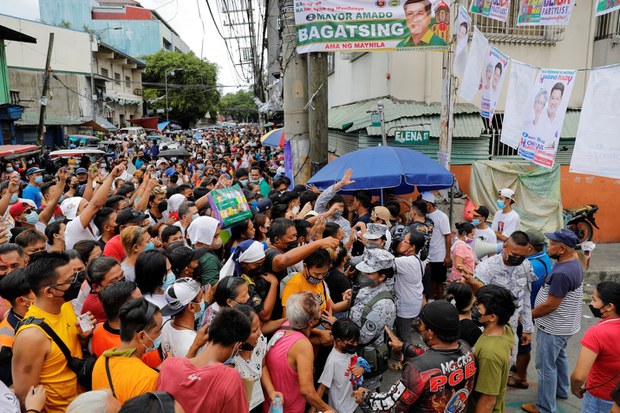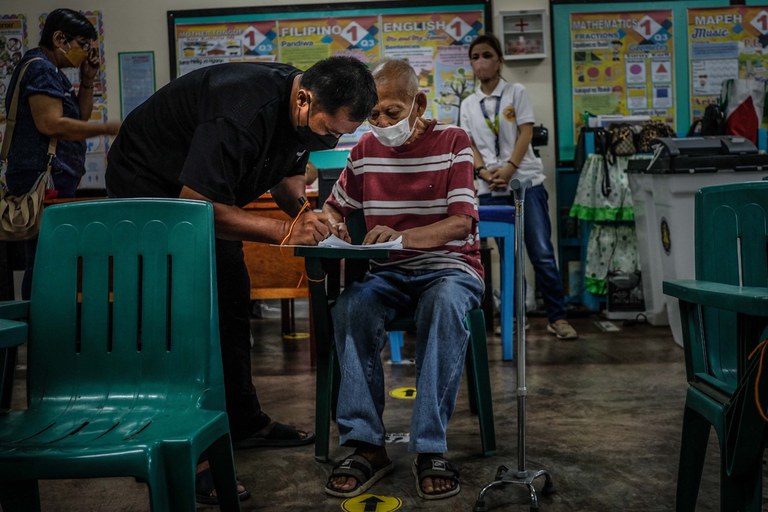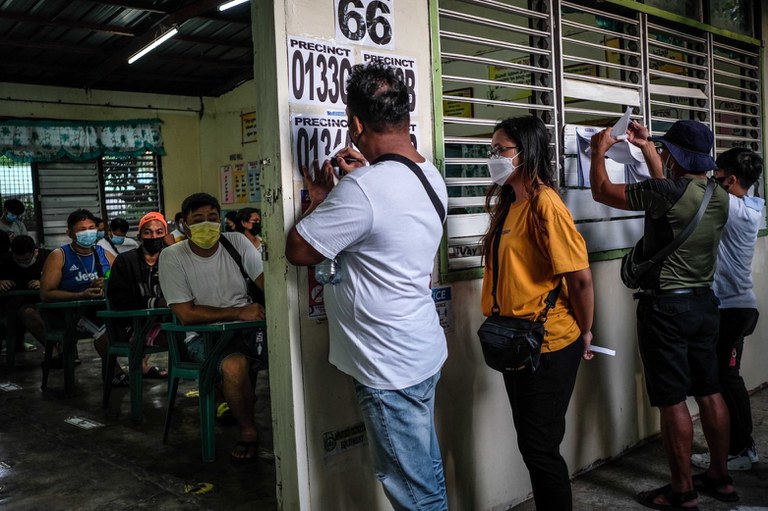Filipinos brave voting delays, violence to cast ballots
2022.05.09
Manila
 Filipinos try to enter a polling precinct during the national elections in Tondo, Metro Manila, May 9, 2022.
Filipinos try to enter a polling precinct during the national elections in Tondo, Metro Manila, May 9, 2022.
Edward Samonte left home early Monday to cast his vote, only to join other voters from his community in lining up for a kilometer outside the polling center.
When he was finally able to get inside the President Sergio Elementary School in Tondo, a suburb of Manila, Samonte had to get help finding his name and precinct number on a list posted by the election commission.
“I am voting for Ferdinand Marcos Jr., but whoever wins still has my support,” Samonte, in his 50s, told BenarNews.
“I want our next leader to focus on resolving corruption problems and creating more livelihood.”
Millions of Filipino voters headed to the polls to cast ballots on Monday, in hotly contested general elections that have been described as the most consequential in decades.
When polls closed at 7 p.m., after 13 hours of operation, there were still long lines in many places.
Turnout was expected to be high at more than 70,000 polling stations. There were 7 million new voters this year; many of whom posted photos on social media after voting for the first time.
“As a first time voter, I feel happy because I was able to vote for the candidates that I’m supporting. Frustrated because the voting machine was not working. Hope the poll watchers do their job,” said @breaking_bas on Twitter.
In months leading up to the vote, the son and namesake of Ferdinand E. Marcos, the Philippine dictator forced from office in a 1986 popular uprising, held a double-digit lead in opinion polls.
His main rival is opposition candidate Leni Robredo, a former human rights lawyer, who defeated him six years ago in the race for vice president.

Nearly 2,000 voting machines, out of more than 106,000, did not work, causing long waiting lines at polling stations.
Mary Estrella, a 57-year-old with a disability, said she had cast her vote at the San Jose Elementary School in Manila’s financial district, but the machine malfunctioned.
“I am holding my ballot now and will wait until the machine replacement arrives. My concern is that my vote might not be counted if I will just hand this over to the teachers (polling workers),” she said.
Election violence and irregularities
In the Philippines, election-related violence and irregularities are a regular occurrence.
Philippine Army spokesman Ramon Zagala told reporters that there had been “15 election-related violent incidents” across the country from Sunday night to Monday afternoon.
Security forces “were able to respond immediately, so we were able to stabilize the situation in those areas that are critical by shifting forces, and the elections continued,” he said, adding, “our presence has provided confidence to our people to vote.”
Three village officials were killed on Monday when gunmen aboard two white vans strafed a polling place in Buluan, in Maguindanao province, a report from the 16th Military Intelligence Company said.
In Datu Unsay, another town in the volatile province, explosions left at least nine people injured on Sunday night.
“Armed men wanted to disrupt the holding of the election. There were people inside the town hall in Datu Unsay – the grenade launchers were fired inside,” said Col. Jibin Bongcayao, a local police official.
Maguindanao was the scene of the bloodiest election-related violence in Philippine history, in 2009, when members of the Ampatuan clan massacred 58 members of their rival clan, the Mangudadatu, their supporters and local journalists.
In nearby Lanao del Sur province, three people were killed within hours of polls opening on Monday in the town of Malabang, officials said, adding that the deceased were supporters of rival mayoral candidates.
In another town in the same province, Binidayan, a supporter of a mayoral candidate was shot dead during an argument.
Also, in the town of Kabacan in North Cotabato province, a homemade bomb exploded in a vacant lot close to a polling center around 9 a.m., but there were no reported casualties.

Meanwhile, Philippine officials asked the public to report on alleged vote-buying and vote-selling during the casting of the ballots.
“If you see something suspicious, report it immediately. Do not hesitate,” said Eduardo Año, secretary of the interior and local government.
“The police will have no second thoughts about arresting violators. That is why we are warning you … those buying votes will be directly arrested,” he said.
The Commission on Elections assured voters that its staff was “in full control of the voting process” and any irregularities were minor.
Monday’s vote is” the most consequential election” in Philippine history in recent decades, Richard Javad Heydarian, an assistant professor of political science at De La Salle University in Manila, said during a webinar hosted by the Stimson Center in Washington on May 5.
Among many issues facing the country, including the COVID-19 pandemic and fallout from the Ukraine war, the election will determine whether Duterte’s successor will continue with the brutal crackdown on illegal drugs that has left thousands dead, or if the next president will help the International Criminal Court probe Duterte over his war on drugs.
The relationship with Beijing is also a top concern for many foreign policy analysts. Duterte has famously tried to cozy up to China.
Rommel Banlaoi, a counter-terrorism analyst at the Philippine Institute for Peace, Violence and Terrorism Research, said the next Philippine president should “recalibrate our foreign policy by pursuing a more cautious approach towards China.”
“It’s good to be friendly, but not too friendly to be subservient to China,” he said.
Froilan Gallardo and Mark Navales in Cagayan de Oro and Lanao del Sur, Philippines, contributed to this report.







